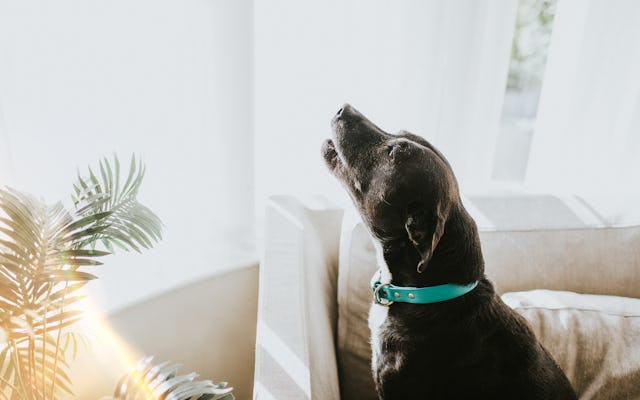Our Dog Won't Stop Barking, & It’s Driving Us Bonkers — Help!
What a vet says you should, and shouldn’t, do.

You love your dog. You love tossing the ball with him at the dog park, you love his snuggles, and you even love his slobbery kisses. But you don't necessarily love his barking. You understand that barking is a form of communication for dogs — for example, it alerts you that he wants to go outdoors or that people are approaching the home — however, sometimes your dog's barking can be a little excessive. And if you're going to be honest, it's driving you a little bananas. After all, your noise tolerance is maxed out most days just with your kids.
First, realizing that your dog isn't purposefully trying to annoy you is important. There might be a few factors explaining why he's barking so much.
"Barking is the primary way of verbal communication for dogs. Like us, dogs use this verbal communication for several reasons, including when they are excited, surprised, reactive, food seeking, bored, fearful, anxious, and many other reasons," Dr. Carling Matejka, DVM and Spokesperson for Solid Gold, explains to Scary Mommy. "By paying attention to the sound of the bark and the nonverbal cues, or body language, you may be able to understand what they are trying to communicate."
Below, Matejka outlines why your dog won't stop barking and what to do about it.
Why Your Dog Won't Stop Barking
According to Matejka, to curb your dog's barking, you must first understand why your pet is barking. Looking at their body language can help you figure this out. Case in point? When your pet is happy barking, Matejka says it will be "more of a high pitch bark with no growling. Often, their tail is wagging eagerly, and their ears are in a normal position."
On the other hand, if your dog is being protective, the bark is typically a bit deeper and associated with a growl. "Their hackles are raised, their body position is very focused, and he/she is leaning forward," she says.
In a lot of cases, says Matejka, if your dog continues to bark, "they may have learned this is how they get your attention."
How to Curb Your Dog's Barking
It's essential to keep in mind that barking is part of a dog's natural behavior. However, Matejka reassures it is possible to train our pets when it's appropriate to bark (when they are startled by something) versus when it is not (when someone rings the doorbell).
"In some cases, unwanted barking can be avoided by understanding why they are barking and training your pet to not bark for just attention," she says. She says you can try a few things with your dog to help curb their barking:
- Remember not to shout when your dog barks. "[Yelling] is very stimulating for them, and they may think that you are joining in," Matejka explains. "Instead, speak calmly and firmly and try to train your dog to understand the word 'quiet.' When your dog is barking, give them a command word like 'quiet' in a calm voice." Once your pet stops barking, praise them with a treat. Restrict from giving them a treat when they are barking, or they will think that barking is what you are praising. "Eventually, they will understand that when you say 'quiet,' they get a treat once they have stopped barking," she says.
- Teach your pet to "speak." "Once they understand this command, you can also teach them a command to stop barking, with hand signals like closing your hand or putting your finger to your lip," Matejka describes. "Let them 'speak' and then do the command; once they are quiet, give them a treat."
- Take them for a long walk or play. If you find that your pet is barking when you leave the house, Matejka recommends taking them for a long walk or playing ball at the dog park before you leave.
- Keep them calm. Matejka also suggests adding calming supplements that will decrease their anxiety naturally, like Solid Gold's Keep Calm and Wag On™. Of course, consult your veterinarian before adding this to your dog's diet.
When to See a Veterinarian
According to Matejka, some medical issues can cause excessive barking, like chronic pain, anxiety, brain disease, and more. Often these are combined with other signs, but Matejka says if you notice a sudden change in the amount of barking your pet is doing or the sound of your pet's bark, you should have them assessed by a veterinarian to make sure that nothing more concerning is going on.